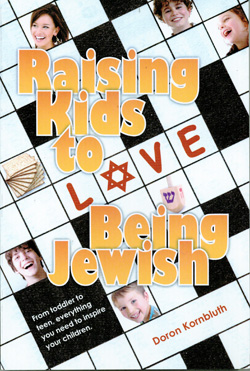Raising Kids to Love Being Jewish by Doron Kornbluth, K’hal Publishing, ISBN 978-1-60204-016-8, 189 pages including notes, retail price unlisted
By Donald H. Harrison

 SAN DIEGO–Anyone who is active in the Jewish community will not be surprised by the suggestions here compiled by Doron Kornbluth, a Jerusalem writer. They follow mainline thinking that if you want your child to be Jewish (much less love being so), you must lead by your example, not by your words. Furthermore, you must incorporate Judaism into your life on a daily basis, not just on holidays and not even just on Shabbat.
SAN DIEGO–Anyone who is active in the Jewish community will not be surprised by the suggestions here compiled by Doron Kornbluth, a Jerusalem writer. They follow mainline thinking that if you want your child to be Jewish (much less love being so), you must lead by your example, not by your words. Furthermore, you must incorporate Judaism into your life on a daily basis, not just on holidays and not even just on Shabbat.
The value of this book is that it sets out clear, comprehensible tips for creating positive Jewish experiences for the children (and in the process for yourself) that go beyond the standard admonitions to “send them to day school,” “send them to Jewish summer camp,” or “send them to Israel.”
As this review is appearing in January, let’s take a look at what Kornbluth suggests for the next major holiday on the Jewish calendar: Purim. Noting the customs of reading the Megillah in the synagogue, distributing money to the poor, delivering food baskets to friends and neighbors, having a Purim feast, dressing up for Purim carnivals, and eating hamantaschen, Kornbluth suggests:
“Children of all ages love Purim and can be involved in all aspects of its observance. Before the holiday, they can help make the baskets of food and treats, decorate the house, and choose or prepare their costumes. On the holiday they dress up in costumes and deliver the baskets (this is a wonderful way of building a sense of community). They can hear the Megillah and make loud noises with a noisemaker whenever Haman’s name is mentioned. And they can join in the meal, dancing and singing. Also some children and/or communities enact hilarious Purim plays that are not to be missed.”
In this manner, Kornbluth is advocating experiences that enable children to experience the holiday with all their senses. Seeing–They look at costumes; Hearing–They listen to the Megillah being read; Touching-They prepare food and distribute it, twirl the noisemaker. Smelling and tasting-They take in the aroma of hamantaschen and other foods. And to these are added the senses of accomplishment (they make a costume, decorate the house) and of being a mentsch (they help the less fortunate, bring gifts to neighbors and friends).
Well, that’s a holiday. What about day-to-day experiences?
Kornbluth emphasizes that children should be taught the importance of being a mentsch. When they do something very nice, a parent can tell them what mentschin they are. When they misbehave, the parents can tell them they really are mentschin but their behavior falls short of their real character. Parents can talk at the dinner table and elsewhere about Jewish and Israeli news, and they can put their pocket change into a tzedakah box kept and encourage the children to do likewise. When it’s time to empty the box, the children can participate in deciding to what cause the tzedakah should be contributed.
There are many more suggestions, but you get the idea. If you want your child to love being Jewish, make being Jewish a pleasant way of life for everyone in the family!
*
Harrison is editor of San Diego Jewish World. He may be contacted at donald.harrison@sdjewishworld.com
Pingback: Book sets out the case for burial instead of cremation | San Diego Jewish World